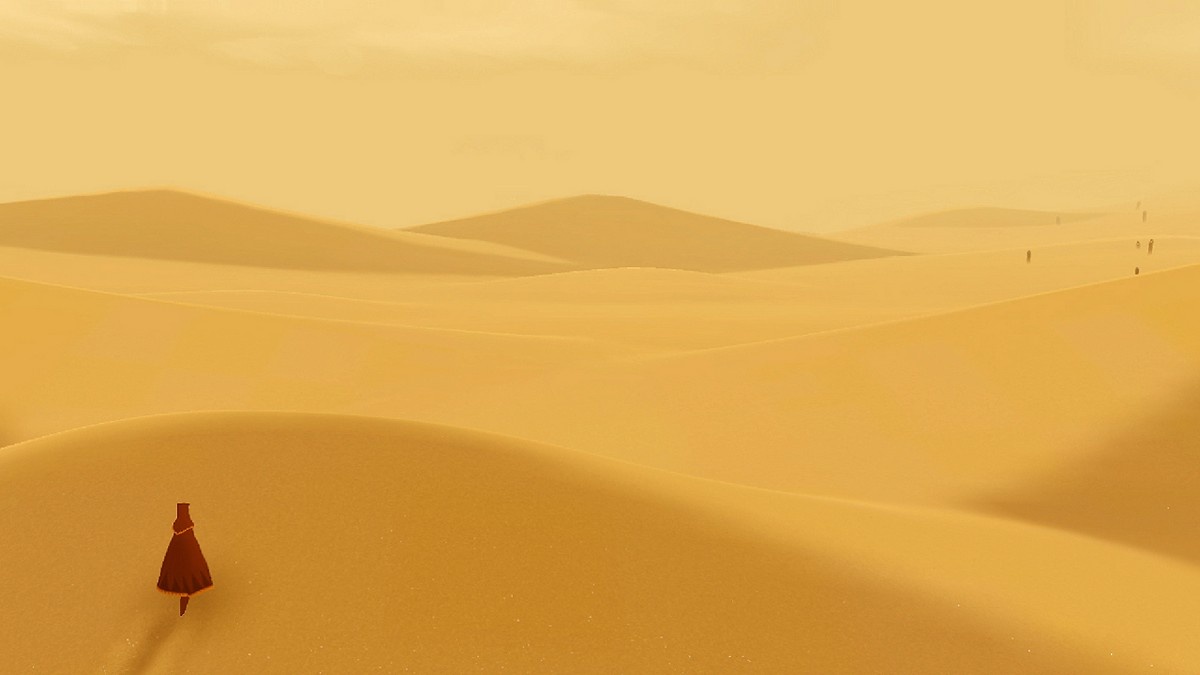Journey Impressions
The minds behind Flower explore the human heart in their next abstract journey for the PlayStation 3.
Game designer Jenova Chen of ThatGameCompany seeks to explore the emotional possibilities that few games have been able to tap. Our final appointment at E3 2010 was with the renowned developer, who talked about his vision for his upcoming game Journey before showing us this beautiful, rapturous game in action. Clearly, Chen wants to make triple-A games, but his "A's" have real meaning: abstract, artistic, and accessible. Using these three pillars, Chen seeks to expand the emotional palette his games have already explored. Chen says that most games explore a very narrow emotional range and that he aims to elicit feelings few games can. And importantly, Journey is the first time ThatGameCompany will be taking its vision to an online space.
Before he showed us Journey in action, Chen outlined his inspirations. He talked about how all of us wield power via modern technology. We use mobile phones, computers, and other technology to exert our will on what is around us. In turn, games focus on giving us further power to wield in their worlds--through guns, superpowers, magic, and more. But Chen felt there was something missing. In a discussion with a NASA astronaut, Chen heard the pilot's stories of how colleagues that walked on the moon returned as changed individuals--more religious, more spiritual. Chen thinks that change is a result of seeing Earth from the moon, which instills a sense of wonder or, as he called it, "a sense of small."
Chen wants to bring that kind of experience to Journey. While most games focus on giving you power, Chen wants you to feel that "sense of small." He wants you to be in awe. And he wants to expand on that emotional gravitas by allowing you to encounter another player within an awe-inspiring, expansive world.
With that, Chen showed us Journey in action. The game begins with a gorgeous cello melody, and we see that we are in a desert. The sand stretches in front of us, and we see a close-up of our own character, an abstract form in a hooded cloak. Chen then briefed us on the controls: you use the Sixaxis tilt-sensing to move the camera, move your character with the left stick, and press one button to jump and another to sing. (More on singing to come.) What is most striking at this point is the sense of loneliness and wonder. Chen echoed this idea by telling us that you will be asking yourself "Who am I? Where am I?" The game is about discovering the answers to these and other metaphysical questions.
The camera zooms in on a mountain in the distance surrounded by clouds. It's immediately clear that reaching this mountain is your goal. And with that goal in mind, Chen lithely runs forward through the sand. He mentioned how important it was for you to feel as if you were moving through sand. You will slide through the sand from the tops of mesas and can even surf on the sand in certain places, where the waves ripple through the sand as if it were an ocean. Soon, Chen encounters a series of stones that light up as he touches them. The glow they produce is beautiful, but Chen remained mum on their purpose.
Soon, Chen finds that the bridge he is traversing has crumbled away, and he must search for a way across. He jumps down, floating as if carried on wings, the cloth of his cloak rippling. We see bits of cloth floating above mesas dotting the sandscape, and Chen heads to one such place. Here he collects the swirling pieces and tells us that these strands are a form of currency that allows you to fly. To show us, he then flies effortlessly through the air before landing once again in the sand. He continues the journey, pointing out a waterfall of sand (a sandfall?) before discovering a stone adorned with hieroglyphs. These and other discoveries will fill you in on the world's history, as well as fill you in on the ongoing narrative, such as it is. Journey features no voice acting or language, so all the storytelling is done with visual cues. However, storytelling might not be the best word used to describe the narrative: Chen refers to it as "story digging."
Chen then discovers a large banner attached to a stone. He is able to leap on it, and it becomes a sort of floating platform from which he can jump and float. He then approaches a spaceship-type structure that opens and releases more bits of cloth, which then float away to create an undulating cloth platform to bridge the gap we had first encountered. We see the character glide across a series of these cloth banners, marveling at the fluidity of the movement and relishing the mysterious music and ambient sound. On the other side, Chen discovers a statue that glows, emitting a flurry of runes and giving us a clue as to the next step of the journey.
Journey is a desolate experience, but you won't be completely alone. You might run into another player--just one at a time--that may join you on your journey. Chen likens this mechanic to hiking: you may come across another, and it is up to you to join each other if you want to. You can't talk with each other by normal means, but you can use the "sing" button to communicate. Chen wants you to develop a relationship with your companion. Perhaps you will ignore this player, or maybe you will join him on his journey. Or perhaps you will see him as an adversary. In any case, while you can finish the game on your own, finding another soul wandering in this forlorn desert is part of Journey's emotional impact.
Journey makes quite an impression. The visuals and sound combine to create a beautiful tapestry of music and color, and it seems clear even at this stage that the game will have a unique voice in an industry crowded with games that seek to offer you immediate power. Jenova Chen is approaching Journey from a different angle, and if what we saw is any indication, this will be one expedition worth embarking on. This PlayStation Network title won't be available until at least next year, but if you appreciate games that can move and inspire you, this is one you should keep a close eye on.
Got a news tip or want to contact us directly? Email news@gamespot.com


Join the conversation